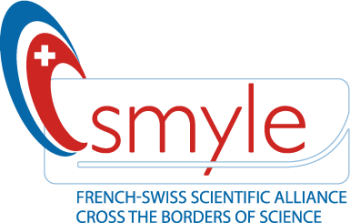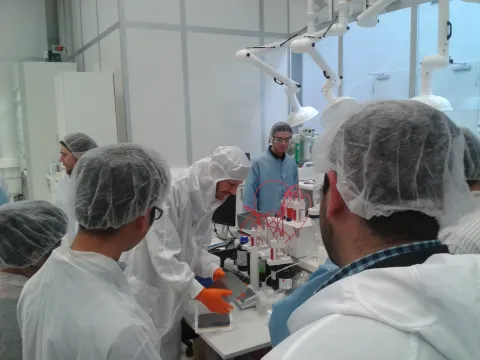International Collegium SMYLE

ObjectiVES
• Strengthen the role of a major European player in the engineering sciences of the Arc Jurassien region by combining the potential of two major engineering institutions.
• Stimulate high-level joint research based on the scientific and technological excellence of the partners and their complementarities.
• Encourage the setting up of common projects on a European scale
• Constitute a pole of attraction for young researchers
• Promote transfer and partnership relations with industry at the cross-border level
• Have sufficient critical mass to achieve international visibility in Research, Training and Innovation.
For more information on SMYLE Collegium activities, please visit here
Context
In 2013, the Franco-Swiss SMYLE Collegium Convention was signed between the French side CNRS, the University of Franche-Comté, the ENSMM and the UTBM (FEMTO-ST supervision) and the Ecole Polytechnique Federal Council of Lausanne (EPFL) on the Swiss side. Thanks to the scientific, thematic and geographical proximity between the FEMTO-ST institute and the EPFL STI School, the creation of the SMYLE Collégium makes it possible to establish a long-term partnership associating research, training and training. innovation in the field of sciences for the engineer.
Research
Collégium SMYLE's research program targets strategic engineering sciences where collaborations between EPFL and FEMTO-ST can merge (photonics, micro-sytems, green tech, quantum physics...)
In 2013, research activities started around 3 axes:
- In vivo biomedical imaging, with firstly the development of components and scanners for MEMS endomicroscopes, and secondly the implementation of microscopy demonstrators on miniature OCT tomography microscope type or confocal microscope applied to imaging, biological tissues.
- Multi-scale micro-robots for biomedical applications, with on the one hand millimetric micro-robots for inspection and action in the human body and on the other hand micro-micro-robots for ultra selective and fast sorting of biological cells.
- The combination of MEMS and time-frequency, which aims to develop MEMS micro-clocks of new generation with very high precision.
In 2015, a photonic axis was integrated. It relates to the design, production and implementation of integrated photonic micro nano-components on chip and on microfilts using opto-acoustic and electro-optical effects. The applications focus on the realization of optical functions for the all-optical processing of information and the creation of micro-nano Brillouin sensors.
In 2016, new partner collaboration between the IT (FEMTO-ST / DISC) and electronics (EPFL / ESPLAB) departments. Research is thus starting up concerning the Internet of Things, the proliferation of data, the "SMART" in the service of the citizen, the low consumption systems.
In 2019/20, a new team takes over the responsibility of the Collégium: Yves Bellouard, head of the Galatea laboratory for EPFL and Michaël Gauthier, CNRS researcher in the AS2M department for FEMTO-ST. With the aim of development and dynamization, new meetings between researchers are scheduled, in the form of laboratory visits and joint seminars.
In 2024, Michaël Gauthier will be replaced by Jean-Charles Beugnot, CNRS Researcher at the Optics department at FEMTO-Institute. A summer school in Optics is being organised and partnership on common areas of research are currently emerging, especially in quantum physics
TRAINING
The training component aims to:
- The establishment of new common lessons and the pooling of French and Swiss educational streams
- The joint organization of thematic days
- The organization of SMYLE summer schools to disseminate research results and stimulate innovation
Innovation
Third pillar of the partnership, this component aims to develop the business / research partnership in the field of engineering innovation in the Espace de l'Arc Jurassien. It is a question for the SMYLE Collegium stakeholders to promote the transfer of technological advances from laboratories to companies, the medical community and citizens. It will also support the region's industrialists in their innovation approach.
CONTACTS
jc.beugnot [at] femto-st.fr (Jean-Charles Beugnot)










